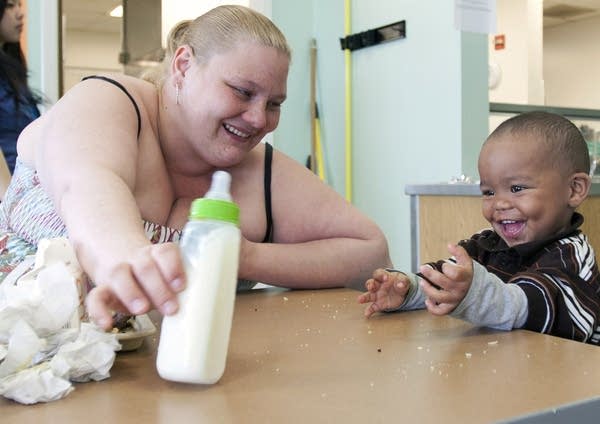A focus on healthier food for the homeless
Go Deeper.
Create an account or log in to save stories.
Like this?
Thanks for liking this story! We have added it to a list of your favorite stories.

A homeless shelter is a last resort for many people, but for hungry Minnesotans, it can also be a relief.
Crystal Blaski remembers how hard it was to feed her two boys when she lived in subsidized housing in Waukegan, Ill.
"A lot of days we didn't have no food," said Blaski, 23. "We used to have to go to neighbors. I'd ask for some bread and peanut butter and jelly, something at least to feed them."
At her lowest point, she stopped eating so her kids would have food. She even stole baby formula.
Turn Up Your Support
MPR News helps you turn down the noise and build shared understanding. Turn up your support for this public resource and keep trusted journalism accessible to all.
Blaski, who moved to the Twin Cities last month, worried about her next meal until she found shelter at Catholic Charities' Family Service Center in Maplewood.
Researchers say the number of Minnesotans who are homeless jumped 25 percent between 2006 and 2009, the latest count. Many people who are homeless rely on shelters and hot meal programs for food. A new group in Ramsey County is working to improve the nutritional quality of those meals.
The effort aims to help people like Blaski, who receives three meals a day at the shelter and can now focus on other priorities, among them finding permanent housing, and obtaining her GED.

"Being in a shelter, a lot of people take it as a bad thing, but sometimes it's a good thing," she said. "It's like a break time. You ain't got to worry about nothing but getting yourself back together."
Thousands of free meals are served in Minnesota each week at shelters and other sites. About a third of homeless Minnesotans rely on those meals, according to Wilder Research in St. Paul.
While the supply of meals doesn't seem to be a problem, the quality of food varies. Sometimes the food may not be nutritious enough, particularly for people with health concerns, said Irene Alton, a nutritionist with Health Care for the Homeless. The group provides health care at shelters and drop-in sites.
In a tiny examination room at the back of the Dorothy Day Center in St. Paul, Alton recently met with a 57-year-old man who is newly homeless in the Twin Cities. Because he has high blood pressure, she advised him to cut down on sodium and eat more whole grains, fruits and vegetables.

Alton frequently sees homeless people who are struggling with health problems, often chronic conditions that have gone untreated.
"There's a lot of people with diabetes, a lot of people with hypertension," she said. "Obesity is very prevalent."
Nearly 25 percent of homeless adults in Minnesota have high blood pressure, and 8 percent have diabetes.
To help people manage those diseases, shelters should serve people more produce and less carbohydrates and sweets, Alton said.
But that can be tough for shelters and meal programs. Fresh fruits, vegetables, and whole grains are more expensive, and harder to come by. They obtain some from food banks and donations, but often not enough.
Many shelters and meal programs also rely on a patchwork of help from volunteers, who sometimes bring in meals.
Alton is grateful for those volunteers, since without them people would go hungry. But she wishes they would think more about nutrition.
"They tend to cook comfort foods a lot, a lot of casseroles, things with potatoes and cream soups," she said. "And kill people with kindness, as far as desserts and cookies and sweet drinks."
Working to change that are members of the Ramsey County Healthy Meals Coalition, made up of people who work in shelters or meal programs. The group is considering bulk purchasing, which would save money and allow them to buy more nutritious food. They've already started training volunteers to prepare healthier foods.
"What you don't want to do is discourage volunteers," said Jerry Lauer, senior program manager at the Dorothy Day Center and part of the coalition. "You don't want to discourage donors. You don't want to discourage people who have been giving to us... for the last 25 years."

Lauer says the process will be gradual, so that shelters don't find themselves unable to provide enough food for the homeless.
"We've committed ourselves to this -- to providing healthier meals every single day for breakfast, lunch and dinner," said Ben Johnson, co-chairman of the coalition.
Johnson leads food operations for the Union Gospel Mission, which serves hundreds of meals daily in St. Paul. He said shelters and meal programs are doing the best they can, but homeless Minnesotans come with many needs, and resources are limited.
He argues that providing homeless people with healthy food is part of the healing process.
"An important step in rebuilding one's life is rebuilding yourself and your body, which you can't do without nutritious and healthy meals," Johnson said.




